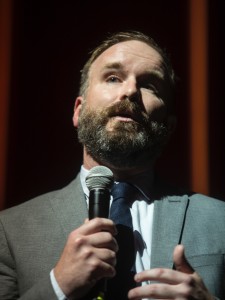When Bryan Doerries ’98 H’17 returns to campus this week to present “Hector, Andromache and the Death of Astyanax,” it will be just the latest example of his life’s work facilitating difficult conversations.
In this case, the event — focused on the human cost of war — will bring together renowned professional actors with a Chorus of eight Kenyon students as part of dramatic readings from Homer’s “Iliad” and “The Trojan Women” by Euripides. But the readings are just the dramatic appetizer. They will be followed by participants initiating a discussion of what resonated with them and a conversation with the audience.
“This model that we’ve been bringing to campuses is aimed at making it easier to have conversations about challenging things and creating spaces of complexity and contradiction,” Doerries said.
The free event from Theater of War Productions, which was co-founded by Doerries, will take place Oct. 16 at 7 p.m. in Oden Auditorium. (RSVPs are required at towpkenyon.eventbrite.com.) Ahead of his visit, Doerries took some time to talk about what’s special about his company’s approach and its intimate connections to Kenyon across the years.
What’s the secret to making an event like this work?
Everything is in service of creating the conditions for dialogue that wouldn’t have happened had we not performed this section of “The Iliad” and “The Trojan Women.” Our whole model is about creating the conditions for open discourse and dialogue and democratized dialogue so that it’s not whether you have a PhD or are an expert in some field, whether it’s classics or Middle Eastern studies or modern urban warfare. The currency of the conversation is proximity — proximity to the issues we’ve come to talk about. And proximity can be, “I’m directly affected by the war” or it can be, “I feel complicit in some way in the suffering of people around the world.”
The objective of performing the ancient Greek texts is to create a space that can hold all the perspectives in the room. We’re not asking the Chorus members to agree. We’re not asking the audience to agree with each other. But we are asking everyone to agree to hear each other’s interpretations of the ancient play and the ancient text that we perform. And that creates the lingua franca, the vocabulary with which we have this conversation that wouldn’t have happened otherwise.
Have you performed this before?
We premiered this project at Columbia University last February. The question of the impact of the war in the Middle East and other parts of the world — Ukraine, Sudan, other parts of the world where war is impacting innocent civilians and children — is something that’s been dividing college campuses all over the country and the world. Our central contention is that you can’t "panel discuss" your way out of the issue or out of the unrest and that we need new forms — and this is a new form.
Why did you focus the project on these particular texts?
I feel like anytime that young people or anyone in particular glosses over the fact that when we speak of war, we’re talking about the deaths of innocent children and civilians, that is a moral injury to the people who are glossing over it. So my hope is that we can recenter the conversation on civilians and children. And that is why we’re presenting these two texts that tell the story of one family at the end of the Trojan War when Troy has been under siege and eventually is burned to the ground. It’s about the death of a child named Astyanax, the son of Hector and Andromache, and remembering or calling back into memory. Hecuba, in my translation of the play, has a line — “It all comes down to a dead boy’s corpse” — that I think is an important recentering of the conversation and something that needs to be remembered in all conversations about warfare. And so it’s both healing and humanizing, I hope, but also it can be challenging and uncomfortable at the same time.
How does your work trace its roots to Kenyon?
I’m an alumnus, and I directed my first play at Kenyon, which was Euripides’ “Bacchae,” as my senior thesis. Some friends and I built an amphitheater on the slope in front of Horn Gallery. On that slope, next to Peirce Hall, we did Euripides’ “Bacchae” with a wide range of community members and students. And that’s where Theater of War got its start in some ways. Working with a broad cross section of people to deliver performances of Greek plays as a framework for engaging communities on a deeper level, it all began at Kenyon, and all of our projects now follow the same format.
What else can students learn from your work?
There’s infinite work to be done with a liberal arts education, as my career since leaving Kenyon has borne out. The repertory of work that we do, the texts that we use to frame dialogue about social issues all over the world, are the very texts that I studied at Kenyon. One of the things we’re also trying to model, and I’m hoping will come across to students, is that one can pursue a life that one loves with a liberal arts degree from Kenyon College without compromising.
